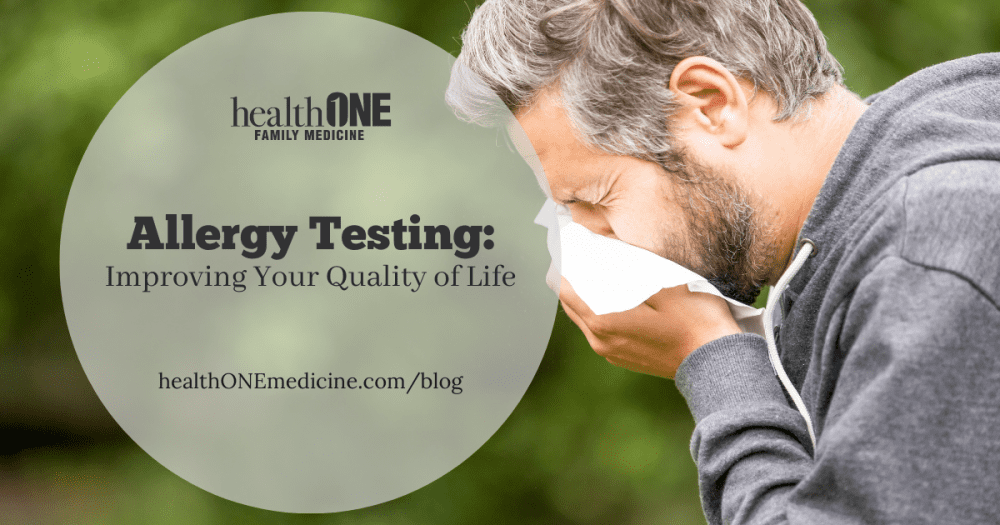Allergy testing is an effective way to identify specific allergens that trigger allergic reactions in individuals. Allergic reactions can manifest in different ways, from mild discomfort to severe pain.
Let\’s look into the world of allergy testing and discover how it plays a vital role in improving the quality of life for allergy sufferers.
What are Allergies?
Allergies can occur when your immune system overreacts to certain substances in the environment, known as allergens. Common allergens include pollen, dust mites, pet dander, certain foods, insect stings, and medications.
When exposed to these allergens, the immune system produces an antibody called immunoglobulin E (IgE), triggering the release of chemicals like histamine, leading to allergic symptoms.
The Role of Allergy Testing
Allergy testing is a valuable diagnostic tool used to pinpoint specific allergens responsible for triggering allergic reactions in people. Healthcare providers develop personalized treatment plans that help manage and minimize the impact of allergies.
Skin tests and blood tests are the two major ways to determine allergies:
Skin Tests
The most common form of allergy testing is a skin test. It typically involves the application of small amounts of potential allergens to the skin, which is then observed for any resulting allergic reactions. The skin is then pricked with a tiny needle to allow the allergen to penetrate the skin\’s surface.
You may develop a small, raised bump at the test site if you are allergic to a particular allergen. The size of the bump helps determine the severity of the allergy.
Intradermal Test
Intradermal tests involve the administration of a small amount of allergen just beneath the skin\’s surface using a fine needle. This test is more sensitive and may be used if the skin prick test results are inconclusive. Intradermal tests are commonly used for allergens such as insect venom or medications.
Both types of skin tests are performed under the supervision of an allergist or healthcare professional trained in allergy testing.
Blood Tests
In some cases, blood tests may be used to detect allergen-specific IgE antibodies in the blood. These tests help measure the level of IgE antibodies present in response to specific allergens.
Blood tests are particularly useful when skin tests cannot be performed, for instance, for people with certain skin conditions. People who take medications that may affect the results should also avoid blood tests. Blood tests are also helpful when assessing allergies to medications or evaluating potential food allergies.
Interpreting Allergy Test Results
An allergy testing specialist or a healthcare professional interprets the results once allergy testing is completed. Positive results indicate an allergic reaction to specific allergens. The severity of the reaction is determined by the size of the skin reaction or the level of IgE antibodies detected in the blood test. These results help develop an appropriate treatment plan.
Managing Allergic Reactions
Once the specific allergens are identified through allergy testing, managing allergic reactions becomes more effective. Here are some key strategies for managing allergies:
Avoidance
The first line of defense in managing allergies is to avoid exposure to known allergens. This may involve making lifestyle changes, such as using dust mite covers for bedding, keeping windows closed during high pollen seasons, or avoiding specific foods or medications that trigger allergic reactions.
It is important to educate yourself about potential sources of allergens and take proactive steps to minimize exposure.
Medications
Allergy medications, both over-the-counter and prescription, can help alleviate symptoms and manage allergic reactions. Antihistamines, nasal sprays, and eye drops are typically used to impact symptoms, such as sneezing, itching, and congestion.
Epinephrine auto-injectors may be prescribed in severe cases to treat severe allergic reactions known as anaphylaxis. It is crucial to contact a healthcare professional so they may help determine the right medication for your specific allergies.
Immunotherapy
For people with severe or persistent allergies, allergen immunotherapy, commonly known as allergy shots, may be recommended. It involves the administration of regular injections of small amounts of allergens over a period of time.
This gradually desensitizes the immune system and reduces the severity of allergic reactions. Immunotherapy can provide long-term relief and potentially modify the course of allergic diseases.
Education and Support
Learning about your allergies and having access to educational resources can help you to manage allergies more effectively. Support groups and allergists can provide guidance, answer questions, and offer coping strategies to improve your quality of life. They can also provide specific instructions on recognizing and responding to severe allergic reactions.
The Final Word
Consulting an allergy testing specialist allows you to identify specific allergens and manage allergic reactions effectively.
If you suspect you have allergies, consult with our experienced healthcare professionals at irvingprimarycare.com. With proper diagnosis and management, you can lead healthier, symptom-free lives and minimize the impact of allergic reactions on your daily activities.
So, get in touch today by calling (469)262-5762 or visiting https://irvingprimarycare.com/.


I was looking at some of your posts on this website and I believe this site is real
instructive! Keep posting.Blog money